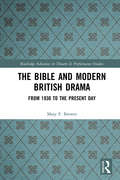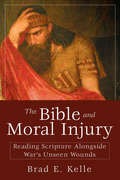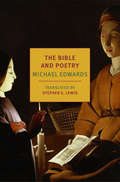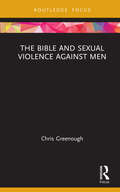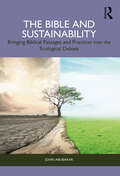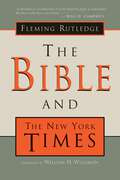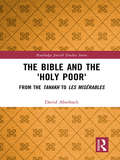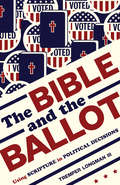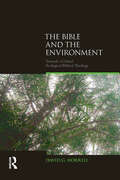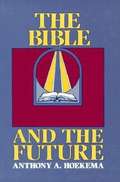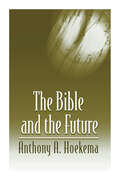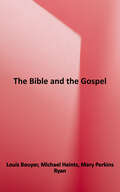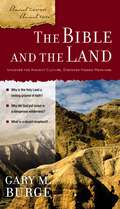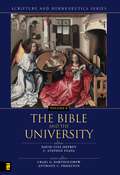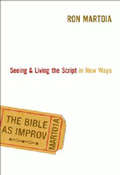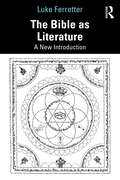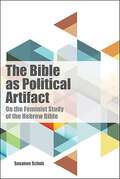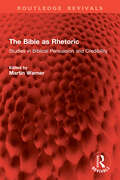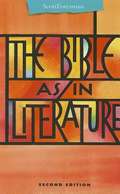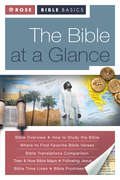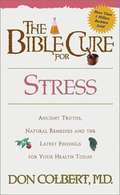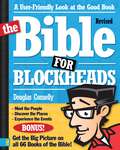- Table View
- List View
The Bible and Modern British Drama: From 1930 to the Present Day (Routledge Advances in Theatre & Performance Studies)
by Mary F. BrewerThe Bible and Modern British Drama: 1930 to the Present Day is the first full-length study to explore how playwrights in the modern period have adapted popular biblical stories, such as Abraham and Isaac, Moses and the Exodus from Egypt, and the life and death of Jesus, for the stage. The book offers detailed and accessible interpretations of the work of well-known dramatists such as Christopher Fry, Howard Brenton, and Steven Berkoff, alongside the work of writers whose plays have been neglected in recent criticism, such as James Bridie and Laurence Housman. The drama is analysed within the context of changes in religious belief and practice over the course of the modern period in Britain, comparing plays that approach the Bible from a traditional religious perspective with those that offer alternative viewpoints on the text, including the voices of gay, feminist, black, Jewish, and Muslim dramatists. In doing so, the author offers a broad and in-depth exploration that is grounded in current scholarship, ranging from the past to present, across boundaries of race and gender. Ideal for students, researchers, and general readers interested in understanding how the Bible has served as an important source text for British playwrights in the twentieth and twenty-first centuries, The Bible and Modern British Drama shows how Bible-based drama has been influential in creating and disseminating ideas of what constitutes a "good" life, both on an individual and social level.
The Bible and Moral Injury: Reading Scripture Alongside War's Unseen Wounds
by Brad E. KelleThe Bible and Moral Injury offers an exploration (with case studies) of the interpretation of biblical texts, especially war-related narratives and ritual descriptions from the Old Testament, in conversation with research on the emerging notion of moral injury within psychology, military studies, philosophy, and ethics. This book explores two questions simultaneously: What happens when we read biblical texts, especially biblical stories of war and violence, in light of emerging research on moral injury?, and What does the study of biblical texts and their interpretation contribute to the emerging work on moral injury among other fields and with veterans, chaplains, and other practitioners? The book begins by explaining the concept of moral injury as it has developed within psychology, military studies, chaplaincy, and moral philosophy, especially through work with veterans of the U.S. military’s wars in Afghanistan and Iraq. A major part of this work has been the attempt to identify means of healing, recovery, and repair for those morally injured by their experiences in combat or in similar situations. A key element for the book is that one feature of work on moral injury has been the appeal by psychologists and others to ancient texts and cultures for models of both the articulation of moral injury and possible means of prevention and healing. These appeals have, at times, referenced Old Testament texts that describe war-related rituals, practices, and experiences (e.g., Numbers 31). Additionally, work on moral injury within other fields has used ancient texts in another way—namely, as a means to offer creative re-readings of ancient literary characters as exemplars of warriors and experiences related to moral injury. For example, scholars have re-read the tales of Achilles and Odysseus in The Iliad and The Odyssey in dialogue with the experiences of American veterans of the Vietnam war and the moral struggles of combat and homecoming. Alongside these trends, consideration of moral injury has increasingly made its way into works on pastoral theology, Christian chaplaincy, and moral theology and ethics. These initial interpretive moves suggest a need for an extended and full-orbed examination of the interpretation of biblical texts in dialogue with the emerging formulation and practices of moral injury and recovery. This book will not simply be an effort to interpret various biblical texts through the lens of moral injury. It also seeks to explore and suggest what critical interpretation of the biblical texts can contribute to the work on moral injury going on not only among chaplains and pastoral theologians but also among psychologists, veterans’ psychiatrists, and moral philosophers. In the end, The Bible and Moral Injury suggests that current formulations of moral injury provide a helpful lens for re-reading the Bible’s texts related to war and violence but also that biblical texts and their interpretation offer resources for those working to understand and express the realities of moral injury and its possible means of healing and repair.
The Bible and Poetry
by Michael EdwardsA fresh, provocative look at the link between poetry and Christianity, both as it relates to the Bible itself as well as to Christian and religious life, by an accomplished scholar. The Bible is full of poems. In the Old Testament, there are the Psalms and the Song of Songs, the great exhortations and lamentations of the Prophets, and passages of poetry woven in throughout. In the New Testament, Jesus describes the kingdom of heaven with poetic epithets such as &“a treasure hid in a field,&” calling the Son of God &“the true vine,&” &“the light of the world,&” &“the good shepherd,&” and &“the way, the truth, and the life.&” The Gospels reverberate with allusions to the poetry of the Old Testament; the last book of all is Revelation, a visionary poem. The Bible, in other words, asks to be read poetically from start to end, and yet readers have rarely considered what that might mean, much less heeded that call.In The Bible and Poetry, the poet and scholar Michael Edwards reshapes our understanding of the Bible and religious belief, arguing that poetry is not an ornamental or accidental feature but is central to both. He speaks personally of his early, unanticipated, transformative encounters with scripture. He offers close, insightful, and resonant readings of biblical passages. Poetry, as he sees it, is the vital and necessary medium of the Creator&’s word, and the truth of the Bible is not a question of precepts and propositions but of a direct experience of its poetry, its power.
The Bible and Sexual Violence Against Men (Rape Culture, Religion and the Bible)
by Chris GreenoughAt least 1 in 6 men have experienced some form of sexual violence. The Bible and Sexual Violence Against Men argues that the shame and stigma around male sexual abuse are interwoven with contemporary social and cultural concepts of masculinity, and are also found in the ancient world and biblical texts themselves. This book is interdisciplinary and has three main areas of exploration: #MenToo? Exploring the myths around sexual violence against men Sexual violence against men in the Hebrew Bible Reading Jesus’ enforced nudity at the crucifixion as sexual violence. Given the enduring importance of the Bible in contemporary society, this book explores the biblical texts that depict sexual violence against men. It examines critical approaches from theology, biblical, and religious studies perspectives, while also exploring insights from the fields of sociology, psychology, and criminology as well as referring to legal cases and legislation, charity work, and media-focussed articles. In seeking to serve a number of interested readers, including those who are not familiar with the Bible, short summaries of the biblical texts under discussion are given in each case.
The Bible and Sustainability: Bringing Biblical Passages and Practices into the Ecological Debate
by John AbubakarThe Bible and Sustainability addresses the ecological crisis the world is facing, and what the Bible can teach us about sustainable living. Drawing on the interest in the ecological debate generated by Laudato Si, this book attempts to push the discussion beyond intellectual perspectives and help students and researchers apply biblical wisdom to the UN sustainable development goals.It begins with a discussion of what sustainability is, and how people, planet, and profit are affected by unsustainable practices, before exploring four specific biblical practices and their relationship with sustainability: Covenants, the sabbatical year, monastic communities, and the fruit of the spirit. It also discusses the creation account and personalistic nature texts, considering the social relationship that humans have with nature. Finally, it examines an Augustinian perspective on sustainability which encourages sharing, common ownership of property, and living simply. The book concludes by inviting governments, civil society organizations, and academia to bring these biblical practices and passages into the ecological debate.It is an outstanding resource for researchers of the Bible and environment, and Religion and environment more generally.
The Bible and The New York Times
by Fleming RutledgeThis collection of vividly illustrative sermons by a leading contemporary Episcopalian preacher eloquently heralds the Christian call to faith in the face of modern challenges.Widely known for their up-to-the-minute relevance to modern life, the sermons of Fleming Rutledge are always out on the edge, challenging the boundaries of contemporary thought and experience. No issue is too threatening, no event too shocking, no question too impertinent to be addressed. Following Karl Barth's dictum that sermons should be written with the Bible in one hand and the newspaper in the other, Rutledge weaves the changing events of the daily news together with the unchanging rhythms of the church seasons. Her book leads readers through the liturgical year, from All Saints to Pentecost, showing how the biblical story intersects with our own stories.
The Bible and the 'Holy Poor': From the Tanakh to Les Misérables (Routledge Jewish Studies Series)
by David AberbachThe Hebrew Bible is the main legislative and literary influence on European Poor Law and on literature on poverty and the poor. No extant literature from the ancient world placed more importance upon social welfare and the duty of the better-off toward the poor. It is the founding text for liberation movements. This book assesses why the Bible is so unambiguously positive in its view of the poor, unlike most later literary and legislative works. It seeks to understand what historical circumstances brought about this elevated perception of the poor, by exploring the clash of ideals and realities in the depiction of the poor in the Hebrew Bible and in European culture. Most legal and literary portrayals of the poor tend to be critical, associating the poor with laziness, crime or fraud: why is this not the case in the Bible? Most societies have tended to accept poverty as a natural condition, but not the Bible. The idea of ending poverty starts in the Bible – the Psalms above all inspired a daily struggle to limit the gap between rich and poor. Much of the Bible sees life - most unusually in the history of civilizations - through the eyes of the poor. The book argues that the popular appeal of the Bible in largely impoverished societies lies in its persistent relevance to, and support of, the poor. Yet, in many ways, biblical teachings were incompatible with social and political circumstances centuries and millennia later. Written in a clear, accessible style, the book shows how the Hebrew Bible, in its legislation and impassioned prophetic poetry, inspired the battle to 'make poverty history', to give dignity and hope to the poor and fight inequality. It will appeal to students and scholars of Jewish Studies, the Bible and Comparative Literature, and Development Studies.
The Bible and the Ballot: Using Scripture in Political Decisions
by Tremper Longman IIIHow to read the Bible on matters of public policyChristians affirm the Bible as our standard of faith and practice. We turn to it to hear God&’s voice. But what relevance does the Bible have for the contentious public policy issues we face today? Although the Bible does not always speak explicitly to modern issues, it does give us guiding principles as we think about how we might vote or act as political figures ourselves. The Bible and the Ballot demonstrates the proper use of Scripture in contemporary political discussions. Christians regularly invoke the Bible to support their positions on many controversial political topics—gay marriage, poverty, war, religious liberty, immigration, the environment, taxes, etc.—and this book will help facilitate those conversations. Tremper Longman provides a hermeneutical approach to using the Bible in this manner, then proceeds topic by topic, citing important Scriptures to be taken into consideration in each case and offering an evangelical interpretation. Longman is careful to suggest levels of confidence in interpretation and acknowledges that often there are a range of possible applications. Each chapter includes questions to provoke further thought in individuals&’ minds or for group discussion. The Bible and the Ballot is a ready guide to understanding the Bible on issues that American Christians face today as we live within a pluralistic society.
The Bible and the Ballot: Using Scripture in Political Decisions
by Tremper Longman IIIHow to read the Bible on matters of public policyChristians affirm the Bible as our standard of faith and practice. We turn to it to hear God&’s voice. But what relevance does the Bible have for the contentious public policy issues we face today? Although the Bible does not always speak explicitly to modern issues, it does give us guiding principles as we think about how we might vote or act as political figures ourselves. The Bible and the Ballot demonstrates the proper use of Scripture in contemporary political discussions. Christians regularly invoke the Bible to support their positions on many controversial political topics—gay marriage, poverty, war, religious liberty, immigration, the environment, taxes, etc.—and this book will help facilitate those conversations. Tremper Longman provides a hermeneutical approach to using the Bible in this manner, then proceeds topic by topic, citing important Scriptures to be taken into consideration in each case and offering an evangelical interpretation. Longman is careful to suggest levels of confidence in interpretation and acknowledges that often there are a range of possible applications. Each chapter includes questions to provoke further thought in individuals&’ minds or for group discussion. The Bible and the Ballot is a ready guide to understanding the Bible on issues that American Christians face today as we live within a pluralistic society.
The Bible and the Environment: Towards a Critical Ecological Biblical Theology (Biblical Challenges in the Contemporary World)
by David G. HorrellThe biblical and Christian traditions have long been seen to have legitimated and encouraged humanity's aggressive domination of nature. Biblical visions of the future, with destruction for the earth and rescue for the elect, have also discouraged any concern for the earth's future or the welfare of future generations. But we now live in a time when environmental issues are at the centre of political and ethical debate. What is needed is a new reading of the biblical tradition that can meet the challenges of the ecological issues that face humanity at the beginning of the third millennium. 'The Bible and the Environment' examines a range of biblical texts - from Genesis to Revelation - evaluating competing interpretations. The Bible provides a thoroughly ambivalent legacy. Certainly, it cannot provide straightforward teaching on care for the environment but nor can it simply be seen as an anti-ecological book. Developing an 'ecological hermeneutic' as a way of mediating between contemporary concerns and the biblical text, 'The Bible and the Environment' presents a way of productively reading the Bible in the context of contemporary ecology.
The Bible and the Future
by Anthony A. Hoekema'Anthony Hoekema brings to the study of biblical prophecy and eschatology a maturity that is rare among contemporary works on the subject. Free of sensationalism, he evinces a reverence for the Scriptures and a measured scholarship. One of the best studies on eschatology available.' ---Christianity Today
The Bible and the Future: Created In God's Image: Saved By Grace
by Anthony A. HoekemaWriting from the perspective that the coming of God's kingdom is both present and future, Hoekema covers the full range of eschatological topics in this comprehensive biblical exposition. The two major sections of the book deal with inaugurated eschatology (the "already") and future eschatology (the "not yet"). Detailed appendix, bibliography, and indexes.
The Bible and the Gospel: The Meaning of Scripture: From the God Who Speaks to the God Made Man
by Louis BouyerThis book expresses the unified nature of God’s revelation to mankind within the continuity of the history of Israel and the life of the Church. Eschewing both sterile historicism and gratuitous allegory, Bouyer provides an illuminating initiation to reading the Old and the New Testaments. For this new edition, Michael Heintz has revised the original English translation, added the previously untranslated Preface, written numerous editorial annotations, and contributed an Introduction that illuminates Bouyer and his theological vision. To paraphrase St. Jerome, “Knowledge of Scripture is knowledge of Christ.” With Bouyer as their trustworthy guide, readers can become rich in that knowledge. Equally erudite and accessible, The book is the perfect gift for students and scholars, preachers and parishioners, and anyone who seeks to know and love the Word of God.
The Bible and the Land (Ancient Context, Ancient Faith)
by Gary M. BurgeAs the early church moved away from the original cultural setting of the Bible and found its home in the west, Christians lost touch with the ancient world of the Bible. Cultural habits, the particulars of landscape, even the biblical languages soon were unknown. And the cost was enormous: Christians began reading the Bible as foreigners and missing the original images and ideas that shaped a biblical worldview. This new book by New Testament scholar Gary Burge launches a multivolume series that explores how the culture of the biblical world is presupposed in story after story of the Bible. Using cultural anthropology, ancient literary sources, and a selective use of modern Middle Eastern culture, Burge reopens the ancient biblical story and urges us to look at them through new lenses. Here he explores primary motifs from the biblical landscape—geography, water, rock, bread, etc.—and applies them to vital stories from the Bible.
The Bible and the Liturgy
by Jean DaniélouThe book primarily focuses on the three sacraments of initiation: baptism, confirmation, and the Eucharist, and follows the development of the rites of these three sacraments, from their biblical roots to their practice in the first five centuries of Christianity.
The Bible and the University (Scripture and Hermeneutics Series)
by David Lyle Jeffrey C. Stephen Evans Anthony C. Thiselton Craig BartholomewIt is well known that the Western university gradually evolved from the monastic stadium via the cathedral schools of the twelfth century to become the remarkably vigorous and interdisciplinary European institutions of higher learning that transformed Christian intellectual culture in the thirteenth and fourteenth centuries. It is equally well known that subsequent disciplinary developments in higher education, including the founding and flourishing of many of the most prestigious of North American universities, owe equally to the Protestant and perhaps particularly Calvinist influence. But that the secularized modern university that descended from these developments is now in something of an identity crisis is becoming widely – and often awkwardly – apparent. The reason most often given for the crisis is our general failure to produce a morally or spiritually persuasive substitute for the authority that undergirded the intellectual culture of our predecessors. This is frequently also a reason for the discomfort many experience in trying to address the problem, for it requires an acknowledgement, at least, that the secularization hypothesis has proven inadequate as a basis for the sustaining of coherence and general intelligibility in the university curriculum. Nowhere is this more apparent than in the disciplines of biblical studies and theology, which once were the anchor or common point of reference for theological thought, but which are now both marginalized in the curriculum and internally divided as to meaning and purpose, even where the Church itself is concerned. In this final volume of the Scripture and Hermeneutic Series, a group of distinguished scholars have sought to understand the role of the Bible in relation to the disciplines in a fresh way. Offered in a spirit of humility and experimentally, the essays here consider the historic role of the Bible in the university, the status of theological reflection regarding Scripture among the disciplines today, the special role of Scripture in the development of law, the humanities and social sciences, and finally, the way the Bible speaks to issues of academic freedom, intellectual tolerance, and religious liberty. Contributors Include: Dallas Willard William Abraham Al Wolters Scott Hahn Glenn Olsen Robert C. Roberts Byron Johnson Robert Cochran, Jr. David I. Smith John Sullivan Robert Lundin C. Stephen Evans David Lyle Jeffrey
The Bible as Improv
by Ron MartoiaEvery Christian desires to follow the Bible. But many of the things the Bible teaches—such as its instructions on how to treat slaves or its direction to sell everything one owns—seem to have little relevance to modern life. Picking and choosing what applies today leaves many readers frustrated and confused. Is it possible that Christians are asking the wrong question of Scripture? Ron Martoia suggests that the narrative sweep of the Bible is lost when it is reduced to quips and maxims. Faithfulness to the text requires faithfulness to its narrative form. Reflecting a high view of Scripture and a profound belief in its power to change lives, Martoia helps readers read the Bible so that its story shapes their own stories. In this new light, readers can move beyond the confusion about what is true today and what is “outdated.” With a passion for seeing people experience revolutionary change in their spiritual lives, Martoia shows readers how to look at the big picture of the Bible. As they will soon find out, the view is incredible.
The Bible as Literature
by Nicola Denzey David Sitino Anthony D. York Charles B. Wheeler John B. GabelEmphasizes what can be factually known about the writing of the Bible.
The Bible as Literature: A New Introduction
by Luke FerretterThis book introduces the Bible as one of the greatest works of world literature. Luke Ferretter provides a comprehensive history of the field, alongside detailed readings of the texts of the Bible and the most influential theories in the area.The Bible as Literature: A New Introduction is divided into groups of texts in the Bible by genre – the Pentateuch; the histories; the poetry; the Wisdom literature; prophecy; the Gospels; the letters; and apocalyptic writing – reflecting the majority of courses. Organized into three sections, each chapter begins with a clear introduction to current theories around who wrote and edited each Biblical book. Ferretter then offers detailed and original literary criticism of that book, encouraging readers to pursue similar literary criticism of the Bible themselves. The final section in each chapter discusses a text related to each Biblical book. These texts include visual, musical, poetic, fictional, philosophical, theological, and psychological works. Throughout the guidebook, there are also useful text boxes and discussion questions, which contextualize examples and enrich students’ understanding. This engaging and accessible introduction reveals the Bible’s significance both as literature and for literary study in light of current Biblical scholarship. It is essential reading for students and scholars of literature, Biblical studies, and cultural studies.
The Bible as Political Artifact: On The Feminist Study of the Hebrew Bible
by Susanne ScholzBiblical studies and the teaching of biblical studies are clearly changing, though it is less clear what the changes mean and how we should evaluate them. In this book, Susanne Scholz engages some of the issues as she has encountered them in the field over the last twenty years. She casts a feminist, class-critical eye on the politics of pedagogy, in higher education and in wider society alike, decrypting important developments in "the architecture of educational power." She also examines how the increasingly intercultural, interreligious, and diasporic dynamics in society inform the hermeneutical and methodological possibilities for biblical exegesis, whether the topic is rape in ancient Near Eastern legislation or Eve and Adam in the American Christian right‘s approaches. In bold strokes, Scholz lays out a program for biblical scholarship and pedagogy that connects to current events and ideas, such as the Title IX debate, inclusive language, or film. Taken as a whole, the fourteen chapters demonstrate that the foregrounding of gender, placed into its intersectional contexts, offers intriguing and valuable alternative ways of seeing the world and the Bible‘s place in it.
The Bible as Rhetoric: Studies in Biblical Persuasion and Credibility (Routledge Revivals)
by Martin WarnerFirst Published in 1990, The Bible as Rhetoric explores the ways in which the persuasive strategies employed in the biblical texts relate (both positively and negatively) to their preoccupations with religious and historical truth. The book contains pioneering interdisciplinary papers that clarify what is at issue in the apparently competing claims that the Bible should be read ‘as literature’ and ‘as scripture’.Uniquely, the volume brings together philosophers, literary critics, biblical scholars, theologians, and historians of ideas who combine the best biblical and historical scholarship with a range of contemporary approaches to the study of texts, from the deconstructive and the feminist through the Wittgensteinian to those of the heirs of the tradition of practical criticism. The volume is of importance both to those interested in the applications of contemporary literary theory and to all those concerned with the relation between religious and secular readings of the Bible.
The Bible as/in Literature: Anthology
by James S. Ackerman Thayer S. Warshaw John SweetLiterature anthology
The Bible at a Glance
by Rose PublishingRose Bible Basics: The Bible at a Glance - What You Need To Know About The BibleRose Bible Basics: The Bible at a Glance contains the basics everyone should know about the Bible. This full-color ebook contains: *A Bible Overview - summarizes each book of the Bible in 100 words or less *A Bible Time Line - compares Bible history and world history side by side *A handy guide on how to study the Bible inductively *Then & Now Bible Maps - shows where biblical events took place and where they are in relation to modern day sitesRose Bible Basics: The Bible at a Glance also contains a handy list of favorite Bible verses, Bible promises, the basics of following Jesus (forgiveness, love, prayer, tithing, salvation, serving, dealing with doubt and fear, trusting in God, and more), and an easy to understand introduction to Bible translations with a comparison chart showing the top 20 english translations. Includes color diagrams, maps, charts, illustrations, and photos throughout and discussion questions to use personally, or in small groups, new members classes, church groups, new believer classes, and homeschools.Rose Bible Basics: The Bible at a Glance combines eight of the most popular Rose pamphlets: Bible Overview, Bible Time Line, How to Study the Bible, Then and Now Bible Maps, Where to Find Favorite Bible Verses, Bible Promises, Following Jesus, and Bible Translations Comparison chart. (A $32 value for only $14.99.)
The Bible cure for Stress
by Don Colberthelp relieve tension and stress and learn how to cope with this silent killer
The Bible for Blockheads-Revised Edition: A User-Friendly Look at the Good Book
by Douglas ConnellyIf you have a hard time making sense of the Bible, The Bible for Blockheads is for you. It will transform what might seem like gobbledygook into incredible significance-enough to change your life. It can do that because the Bible is more amazing than you'
